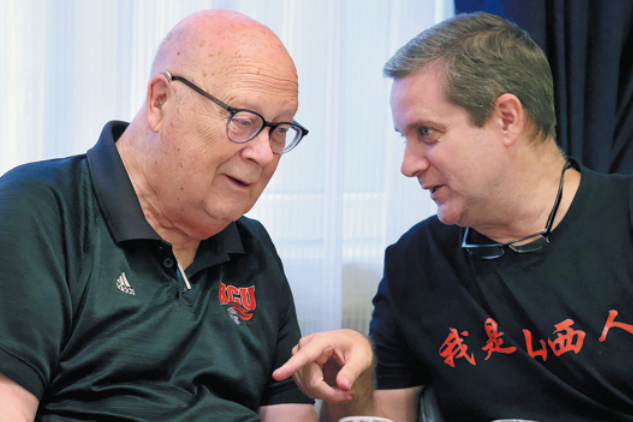Humanistic spirit drives Sino-Thai ties
By Jiang Jianguo | China Daily | Updated: 2017-04-08 08:43
First, it comes from President Xi's deep love for excellent traditional Chinese values and concepts. Politicians and thinkers in ancient China accumulated a lot of political wisdom on the world's governance, created an ideological system that put stress on love, people, integrity, justice, and harmony and solidarity, and left to their offspring a series of cultural classics and valuable books such as the Collection of Ancient Texts, Book of Rites, Analects of Confucius, and Doctrine of the Mean.
President Xi holds deep love for excellent traditional Chinese cultures, and has extensively read ancient classical books and gained full knowledge of ancient and present-day society. With creative conversion and innovative enrichment of traditional Chinese cultures, President Xi has formed, enriched and developed his thoughts on the governance of China. It is the excellent traditional Chinese cultural essence that has nourished his humanistic spirit.
Second, it comes from President Xi's high degree of confidence in the socialist advanced cultures of China. President Xi not only loves excellent traditional Chinese culture, but also has full confidence in the advanced culture created by the CPC in its practices of building the nation. The root of traditional Chinese cultures is the people, and the basic position of Marxism is the "masses". The combination of the two spirits has helped the CPC form its own purposes.
People interested in China may find an interesting phenomenon, that is, the initial and latest fruits of the Sinicization of Marxism are both related to "cave dwellings" in the northwest of China. In September 1944, Chairman Mao Zedong put forward the "serve the people" thought in a cave dwelling in Yan'an, Northwest China's Shaanxi province. At a young age, Xi lived for seven years in a cave dwelling in Yan'an, nurturing his deep feelings toward the people. "Marxism in cave dwelling" is in essence a people-first and people-centered outlook. President Xi's words that "people's yearning for a better life is the goal of our struggles" exactly embodies his confidence in Chinese culture.
Third, it comes from Xi's full respect for the excellent fruits of all human civilizations. Some chaotic developments in today's world are challenging the red line of the international order and the moral bottom line of mankind, and our blue planet is, from time to time, smeared by the bloody stains of the law of the jungle. President Xi proposes that world civilizations be colorful, equal and inclusive, and all countries and nationalities promote mutual learning, mutual reference, pay mutual respect to each other and treat each other as equals. He holds that China should absorb and learn from the fruits of all excellent human civilizations. He also proposes mankind ponder over such questions as "where we come from, where we are now and where we are going", and that mankind should take hold of the themes of the times-peace, development, cooperation and win-win-to build a human community of share destiny. We now happily see that Xi's such proposals have been continuously included in UN resolutions and have become a consensus of the international society. The respect paid by President Xi to different civilizations and his conception of the community of shared destiny incarnate China's responsibilities, China's wisdom and China's role.
Certainly, collected in this book are only President Xi's remarks and instructions before June 2014, and there are a lot of his other important remarks and instructions that have not been compiled and included in the book. However, the backbone of his thoughts on China's governance is already on display in this book. In the latter half of this year, the 19th National Congress of the CPC is due to be held, and after that we will make some extractions and summarizations of his new thoughts on China's governance and continuously share them with all of you.
Thailand is an important stop on the Maritime Silk Road. During his voyages to the Western seas, Zheng He, a great Chinese navigator during the Ming Dynasty (1368-1644), and his vessel team made a stopover in Bangkok. China and Thailand are good neighbors, partners, friends and relatives. They are like two sails of the same boat of the Maritime Silk Road and two melons of the same vine that have a shared destiny.
Many Chinese like traveling to Thailand, known as the "Kingdom of Buddhism" the "Nation of Elephants" and the "Land of Smiles". Lost in Thailand, a movie directed by a Chinese director with Thailand as the base a few years ago, became very popular among Chinese audiences. This is a successful case of Chinese and Thai cultural blending.
President Xi has stressed many times that "China and Thailand are close like being in one family". Buddhism emphasizes causality and good fortune. China and Thailand are exactly two countries that share causal links and what the idea of "being in one family" pursues is common development and good fortune for both countries. We hope that the circulation of Xi Jinping: The Governance of China in Thailand will help further promote mutual learning, mutual reference and mutual improvement between the peoples of the two countries and bring them more benefits and contribute to world people.
The author is the minister of State Council Information Office. The article is an excerpt from the speech he delivered at the launching ceremony of the Thai translation of Xi Jinping: The Governance of China in Bangkok, Thailand, on April 7.
- Global governance needs the wisdom of China
- Make world great, with global governance
- Xi lights up path ahead for better global governance
- China pushes for fair, inclusive global governance
- Experts: Time for China to play bigger role in global governance
- China offers new idea on human rights governance
























